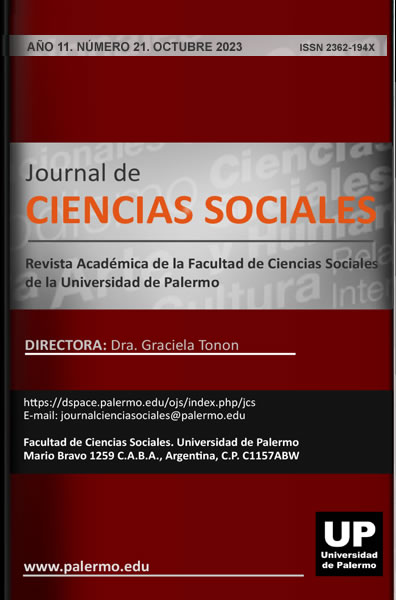Scope of transitional justice in a context of criminal violence and state fragility. Notes on the Mexican case
Abstract
The scope of transitional justice has expanded over time, no longer exclusively concerning countries that have just transitioned to democracy and want to process a past of abuses, but also countries that suffer from internal armed conflicts or that have just emerged from one. That is, transitional justice is credited with the possibility of pacifying societies in conflict. This essay arises from the questioning of his ability to achieve peace agreements in a society like Mexico's, characterized by a crisis of criminal violence. The hypothesis articulating the research is that its potential to build peace depends on the interests and motivations of the groups involved, and the strength of state institutions. The objective is to show that, in the Mexican case, transitional justice cannot contribute to the pacification of the country, given the complex nature of criminal violence and the context of state fragility. This is a qualitative documentary research, which traces causal processes through which it links the failed experiences of transitional justice in the country with the explosion of criminal violence, and contributes to the understanding of the futility of trying to negotiate peace processes with criminal groups.
Downloads
References
Aguayo, S. y Treviño, J. (2007). Fox y el pasado. La anatomía de una capitulación. Foro Internacional 190, XLVII(4), 709-739. https://forointernacional.colmex.mx/index.php/fi/article/view/1865
De la Calle, L. y Schedler, A. (2021). ¿Borrón sin cuenta nueva? La injusticia transicional en guerras civiles económicas. Perfiles Latinoamericanos, 29(57), 195-220. doi: dx.doi.org/10.18504/pl2957-008-2021
Domingo, P. (2012). Dealing with legacies of violence: transitional justice and governance transitions. Background Note. The Overseas Development Institute.
Fuerte Celis, M. D. P. (2016). Geografía de la violencia en México. Un acercamiento a la reconfiguración territorial de la violencia generada por el crimen organizado. Cuadernos de trabajo del monitor del programa de política de drogas (Vol. 15). CIDE.
Guevara, J. A. (2022). México: ¿un país en guerra? [Monográfico Violencias fuera de contextos bélicos]. Por la Paz, (40). https://www.icip.cat/perlapau/es/articulo/mexic-un-pais-en-guerra/
Olsen, T. D., Payne, L. A. y Reiter, A. G. (2010). Transitional justice in the world, 1970-2007: Insights from a new dataset. Journal of Peace Research, 47(6), 803-809. http://www.jstor.org/stable/20798965
Puig, S. (2022). Apuntes para una agenda de paz [Monográfico Violencias fuera de contextos bélicos]. Por la Paz, (40). https://www.icip.cat/perlapau/es/articulo/apuntes-para-una-agenda-de-paz/
Sarkin, J. (2021). Why the Theory and Practice of Transitional Justice Needs to be Better Integrated in all Places around the World. AlMuntaqa, 4(1), 39–55. https://www.jstor.org/stable/10.31430/almuntaqa.4.1.0039
Trejo, G., Albarracín, J. y Tiscornia, L. (2018). Breaking state impunity in post-authoritarian regimes: Why transitional justice processes deter criminal violence in new democracies. Journal of Peace Research, 55(6), 787-809. https://journals.sagepub.com/doi/10.1177/0022343318793480
Zyl, P. v. (2011). Promoviendo la justicia transicional en sociedades post conflicto. En F. Reátegui (Ed.), Justicia transicional: Manual para América Latina (pp. 47-72). Comisión de Amnistía del Ministerio de Justicia de Brasil. https://www.corteidh.or.cr/tablas/r29755.pdf
Otros documentos consultados
Ballinas, V. (2010, abril 13). Muertes de civiles en el combate al crimen, daños colaterales: Galván. La Jornada. https://www.jornada.com.mx/2010/04/13/politica/005n1pol
Belmont, J. A. (2018, abril 12). Con “abrazos, no balazos”, AMLO promete reducir violencia. Grupo Milenio. https://www.milenio.com/politica/abrazos-balazos-amlo-promete-reducir-violencia
Centro de Investigación y Docencia Económicas, A.C. (CIDE) (2018). Estudio para elaborar una propuesta de política pública en materia de Justicia Transicional en México. México: CIDE-CNDH. https://www.cndh.org.mx/sites/default/files/documentos/2019-01/Estudio_Justicia_Transicional_Mexico.pdf
Comisión para la Verdad y Acceso a la Justicia del Caso Ayotzinapa (CVAJ) (2022). Informe de la Presidencia de la Comisión para la Verdad y Acceso a la Justicia del Caso Ayotzinapa. Gobierno de México.
Comisión de la Verdad del Estado de Guerrero (ComVerdad) (2014). Informe Final de Actividades. https://sitiosdememoria.segob.gob.mx/work/models/SitiosDeMemoria/Documentos/PDF/InformeFinalCOMVERDAD.pdf
Comisión Mexicana de Defensa y Promoción de los Derechos Humanos, A.C. (CMDPDH). (2017). Seguridad interior, ¿seguridad para quién? México. https://www.cmdpdh.org/publicaciones-pdf/cmdpdh-seguridad-interior.pdf
Comité Internacional de la Cruz Roja (CICR) (2012). Conflictos internos u otras situaciones de violencia: ¿cuál es la diferencia para las víctimas?, 10 de diciembre. Icrc.org. https://www.icrc.org/es/doc/resources/documents/interview/2012/12-10-niac-non-international-armed-conflict.htm
de Greiff, P. (s/f). Some thoughts on transitional justice. Association for the Prevention of Torture (Apt.ch). https://www.apt.ch/sites/default/files/publications/mena-digest_pablo-de-greiff_some-thoughts-on-transitional-justice_04_2013.pdf
Instituto Nacional de Estadística y Geografía (INEGI) (2022). Encuesta Nacional de Victimización y Percepción sobre Seguridad Pública (EMVIPE) 2022. Principales Resultados. Presentación nacional, México. https://www.inegi.org.mx/contenidos/programas/envipe/2022/doc/envipe2022_presentacion_nacional.pdf
Jiménez, N. (2022, agosto 22). Comisión de la Verdad sobre guerra sucia analiza expedientes. La Jornada. https://n9.cl/9fzno
Kitroeff, N., Bergman, R. y López, O. (2022, octubre 26). El caso de Ayotzinapa se resolvió en México. Hasta que las pruebas se desmoronaron. The New York Times. https://www.nytimes.com/es/2022/10/26/espanol/mexico-ayotzinapa-pruebas-amlo-encinas.html
México Unido Contra la Delincuencia, A.C. (MUCD) (2021). Atlas de homicidios: México 2020. México, MUCD.
Milenio Digital. (2021, septiembre 25). ¿Qué dice la “verdad histórica” del caso Ayotzinapa? Grupo Milenio. https://www.milenio.com/politica/verdad-historica-del-caso-ayotzinapa-que-dice
Pérez, S. J. C. (2014, mayo 29). Los carteles mexicanos que no dependen del narcotráfico. BBC News Mundo. https://www.bbc.com/mundo/noticias/2014/05/140529_mexico_carteles_no_dependen_droga_zetas_templarios_jcps
Solalinde, J. A., Jiménez, M. P. y Osorno, D. E. (2016). ¡Ya sabemos! No más impunidad en Oaxaca. Informe de la Comisión de la Verdad sobre los hechos que motivaron las violaciones a los derechos humanos al pueblo oaxaqueño en 2006 y 2007 (Versión Ejecutiva). https://www.dropbox.com/s/olgkklqskg6tmgy/INFORME-FINAL-COMISION-DE-LA-VERDAD-DE-OAXACA.pdf?dl=0
TResearch Internacional (2023, julio 17). La guerra en números. Recuperado de: https://www.tresearch.mx/estudios/categories/la-guerra-en-numeros (17/10/2023)
United Nation Office on Drugs and Crime (UNODC) (2019). Global Study on Homicide. Executive summary (2019). Viena. https://www.unodc.org/unodc/en/data-and-analysis/global-study-on-homicide.html
The authors retain the rights to their work guaranteeing this journal the right of first publication, committing to cite the Journal of Social Sciences as a reference of the original publication.
The works published in the Journal are published under the terms indicated in the Creative Commons License with the International Attribution 4.0 (CC BY 4.0).




























